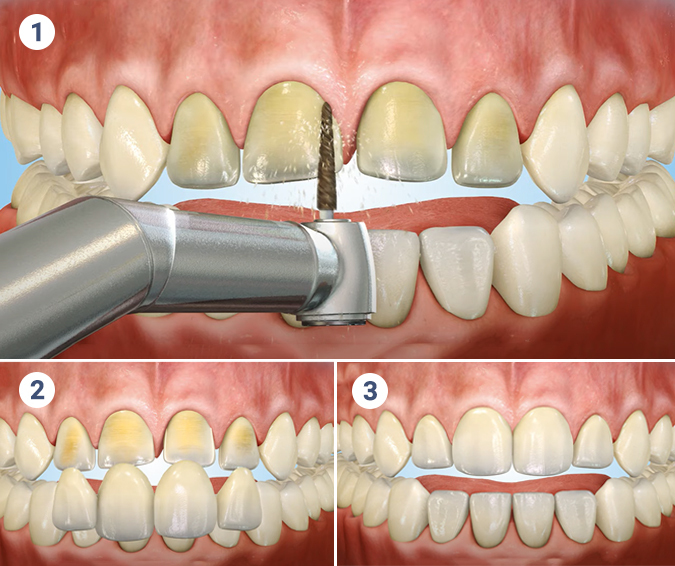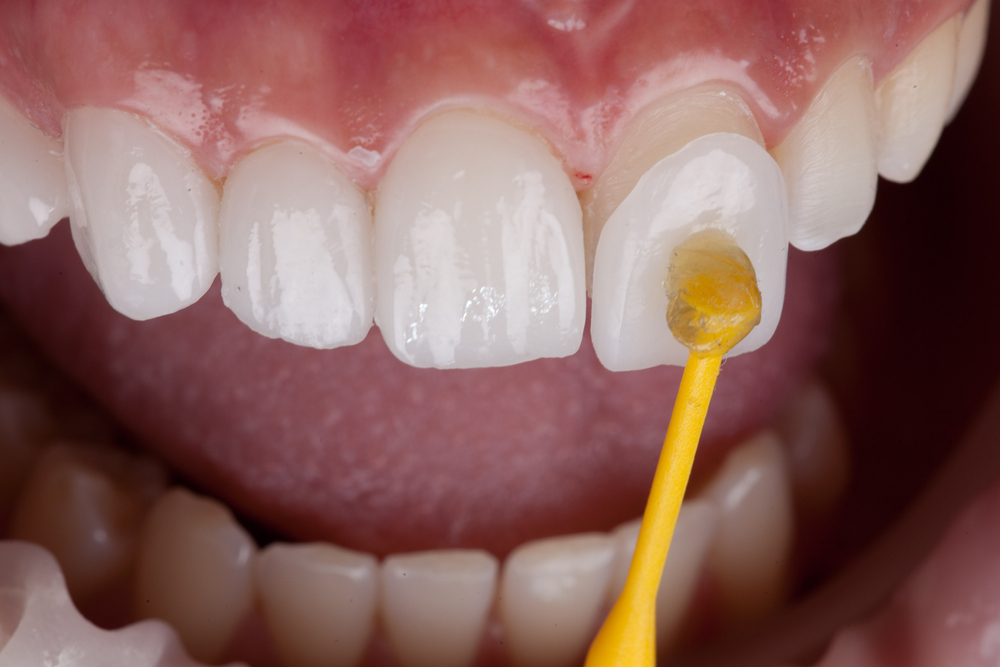The Full Review of Veneers: Kinds, Makes use of, and Their Effect on Your Smile
Veneers function as a preferred solution for individuals seeking to improve their dental aesthetics. These custom-crafted coverings can efficiently mask flaws such as staining and voids. With two main types available, porcelain and composite material, each offers unique advantages and restrictions. The effect of veneers extends beyond plain appearance, influencing self-confidence and social interactions. Comprehending their types and advantages is necessary. What might this suggest for one's overall lifestyle?
Comprehending Veneers: What They Are and How They Function
Veneers are thin coverings, generally made from porcelain or composite resin, that are custom-crafted to fit over the front surface of teeth. They serve both functional and aesthetic objectives, offering an option for numerous oral imperfections such as discoloration, gaps, and small misalignments. By adhering to the tooth enamel, veneers develop a natural look while boosting the shape and shade of the teeth.
The process typically entails a preliminary appointment, where a dental practitioner assesses the patient's demands and discusses desired outcomes - Dental Veneers. Following this, a very little quantity of enamel might be gotten rid of to suit the veneer. Perceptions of the teeth are after that required to ensure a specific fit. When produced, the veneers are adhered safely to the teeth using an unique oral adhesive. This procedure not just enhances the smile's look but likewise assists shield the underlying teeth from additional damage, making veneers a prominent selection for lots of seeking a smile makeover
Kinds of Veneers: Porcelain vs. Compound Resin
The distinction in between porcelain and composite material veneers depends on their product structure and characteristics. Each kind provides varying levels of longevity, sturdiness, and expense, influencing patients' options based on their private demands. Comprehending these distinctions is vital for making an informed decision concerning dental improvements.
Material Differences Discussed
While both porcelain and composite material veneers serve the very same cosmetic purpose, they vary considerably in material properties, toughness, and visual results. Porcelain veneers are crafted from a ceramic product that mimics the natural translucence of teeth, giving a lifelike look. Their smooth surface area is resistant to staining, making them an attractive alternative for those seeking a durable aesthetic. On the other hand, composite material veneers are made from a tooth-colored plastic product, offering versatility and simplicity of application. Nonetheless, they might not achieve the exact same level of brightness or translucency as porcelain. Additionally, composite veneers can be more easily formed and repaired, making them an extra flexible option in specific oral circumstances. Each kind provides special advantages customized to specific preferences.
Long life and Resilience
Durability and sturdiness are considerable aspects when contrasting porcelain and composite material veneers. Porcelain veneers are understood for their stamina, commonly enduring 10 to 15 years with appropriate care. Their resilience against chipping and staining makes them a popular option for people looking for long-lasting results. In comparison, composite material veneers commonly have a much shorter life expectancy, averaging 5 to 7 years. While they can be fixed a lot more quickly if damaged, they are more at risk to put on and staining gradually. The selection between these materials commonly depends on the person's way of living, aesthetic goals, and upkeep choices. Inevitably, understanding the distinctions in long life and resilience can guide clients in picking the veneer kind that best matches their demands.
Cost Comparison Insights
When picking between porcelain and composite material veneers, cost is a critical consideration. Porcelain veneers commonly range from $800 to $2,500 per tooth, reflecting their toughness, aesthetic charm, and resistance to staining. These veneers need an extra substantial procedure and specialized lab job, adding to their greater cost. On the other hand, composite material veneers are generally a lot more budget-friendly, setting you back between $250 and $1,500 per tooth. They can be applied in a solitary see, which minimizes labor prices. Composite veneers may need much more frequent replacements, possibly increasing long-term costs. Inevitably, the selection between porcelain and composite resin veneers depends upon private budgets and preferred end results, stabilizing initial expenses versus longevity and visual results.
The Benefits of Deciding On Veneers for Your Smile
Picking veneers supplies significant benefits for those seeking an improved smile. Their improved visual allure can change the look of teeth, while their stain-resistant homes ensure a long-term illumination - Veneers Teeth. This combination makes veneers a popular alternative for people aiming to attain a remarkable smile
Boosted Visual Charm
When individuals seek to enhance their smiles, veneers frequently arise as a popular service because of their transformative aesthetic benefits. These slim shells, generally constructed from porcelain or composite resin, can properly conceal imperfections such as chips, gaps, and imbalance. By imitating the all-natural appearance of teeth, veneers supply a smooth, radiant smile. Their personalized nature permits a customized strategy, allowing individuals to select tones and forms that finest fit their face functions. In addition, veneers can produce an uniform look, improving total face symmetry. This visual enhancement not only boosts self-confidence however can likewise positively affect individual connections and social communications, making veneers a prominent choice for those looking to accomplish a brighter, more eye-catching smile.
Stain Resistance Benefits
Veneers not only improve visual appeal however also provide substantial stain resistance, making them an eye-catching alternative for individuals worried about keeping a bright smile. Composed of sturdy materials such as porcelain or composite resin, veneers are much less porous than natural teeth, which assists protect against the absorption of stains from typical wrongdoers like coffee, tea, and merlot. This integral stain resistance enables people to appreciate their favored beverages without bothering with discoloration. What Are Veneers. Furthermore, the smooth surface area of veneers makes them easier to clean, further enhancing their longevity and keeping their excellent look. Because of this, veneers offer a useful option for those seeking both appeal and the original source capability in their oral care
The Process of Getting Veneers: What to Expect

The process of obtaining veneers might appear daunting, understanding the steps involved can alleviate concerns. A consultation with a dentist is necessary to establish if veneers are the appropriate service for the person's dental issues. Throughout this consultation, the dental practitioner will certainly go over wanted end results and take impressions of the teeth.
Next off, a 2nd appointment is scheduled for tooth prep work, where a percentage of enamel is usually gotten rid of to suit the veneers. Short-term veneers may be put while the customized ones are crafted in a dental lab, which generally takes a number of weeks.
Once prepared, the dentist will certainly place the veneers, ensuring correct fit and color prior to bonding them to the teeth utilizing a special adhesive. After final changes, the dental expert will supply assistance on treatment. Comprehending these actions can assist patients really feel a lot more comfortable and educated throughout the veneer process.
Upkeep and Care for Your Veneers
Preserving veneers calls for consistent care to assure their longevity and look. Proper oral hygiene is essential; cleaning two times daily with a non-abrasive tooth paste and flossing frequently aid stop plaque buildup around the veneers. Furthermore, regular oral check-ups are important for checking the condition of the veneers and dealing with any kind of prospective problems beforehand.
Patients ought to prevent tough foods and too much force when biting to avoid damage. It's also recommended to limit usage of staining substances, such as coffee, tea, and merlot, as these can influence the veneers' shade gradually.

Transforming Your Smile: Real-Life Effect of Veneers
A radiant smile can substantially enhance one's self-confidence and overall appearance. For many people, veneers work as a transformative solution, properly dealing with numerous dental concerns such as discoloration, spaces, and misalignment. These thin shells, customized to fit over the front of the teeth, can create a harmonious and cosmetically pleasing smile.
Real-life situations highlight the profound influence veneers can have. Clients usually report a prompt increase in self-worth and social communications following their treatment. The newly found self-confidence can result in more opportunities in professional and personal life, as individuals feel even reference more likely to involve and share themselves.
In addition, the emotional advantages prolong beyond simple appearance; numerous experience improved psychological wellness as they accept their smiles. Veneers not only boost physical qualities but additionally contribute greatly to total top quality of life, emphasizing their value in aesthetic dentistry.
Regularly Asked Concerns
The Length Of Time Do Veneers Typically Last Prior To Needing Substitute?
Veneers generally last between 10 to 15 years before calling for substitute. Elements such as dental hygiene, oral routines, and the kind of product utilized can influence their longevity and overall durability. Normal dental exams are a good idea.
Can Veneers Be Removed, and if So, Just how?
Yes, veneers can be removed. A dental professional commonly uses specific devices to carefully detach them from the teeth, making sure very little damages to the underlying enamel, commonly complied with by necessary modifications or restorations for suitable aesthetic appeals.
Are Veneers Suitable for Every person's Dental Problem?

Will Obtaining Veneers Hurt or Require Anesthesia?
Obtaining veneers typically entails very little pain, and lots of patients obtain regional anesthesia to guarantee a pain-free experience. Level of sensitivity may take place briefly afterward, however most discover the procedure bearable and are pleased with the outcomes.
How Do Veneers Affect Tooth Level Of Sensitivity After Placement?
Veneers can momentarily increase tooth sensitivity as a result of the elimination of enamel and the bonding procedure. Many individuals experience a decline in level of sensitivity in time as the teeth get used to the new veneers.
Veneers are slim coverings, normally made from porcelain or composite material, that are custom-crafted to fit over the front surface of teeth. Porcelain veneers are crafted from a ceramic material that imitates the all-natural translucence of teeth, offering a realistic look. Porcelain veneers normally range from $800 to $2,500 per tooth, mirroring their resilience, visual appeal, and resistance to discoloration. In contrast, composite material veneers are normally extra inexpensive, setting you back between $250 and $1,500 per tooth. Made up of long lasting products such as porcelain or composite material, veneers are less porous than natural teeth, which assists stop the read this absorption of spots from usual offenders like coffee, tea, and red wine.